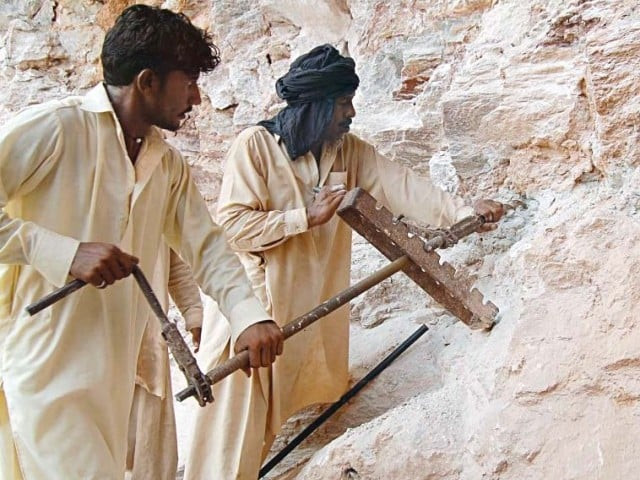Work force: Draft policy on workplace safety seeks strict penalties for violations, universal coverage
The policy pegs penalties to harm caused to workers due to violation of safety standards

Activists involved in the drafting process say improved standards will result only if the govt is sincere in enforcement. PHOTOS: MUHAMMAD JAVAID
The policy pegs penalties to harm caused to workers due to violation of safety standards. It seeks a Rs100,000 fine, a prison term of one year or both for first-time offenders. If a violation results in an injury to a worker, the employer could be fined up to Rs200,000, sent to the prison for up to two years or both. It prescribes a Rs1 million fine, a prison term of up to 25 years or both for violations that result in death of a worker. It says that the prison term cannot be less than seven years for such violations. It prohibits release on bail of suspects during investigation.
Legal experts and union activists involved in the drafting of the policy say that with mild penalties prescribed for safety violations the existing laws are not strong deterrents. The Factories Act prescribes up to Rs20,000 fine for first-time offenders and a prison term of up to six months for repeat offenders. A prison term of up to one year and Rs4,000 fine or both is the maximum penalty imposed under the Mines Act.
Several other laws deal with workplace safety concerns. These are Dock Laborers Act of 1934; Workmen Compensation Act of 1923; Provincial Employees Social Security Ordinance of 1965; West Pakistan Shops and Establishments Ordinance of 1969 and the Boilers and Pressure Vessels Ordinance of 2002.
They also criticise existing laws for not covering units employing less than 20 workers and lack of any mechanism for consideration of feedback from workers’ representatives.
To fix these shortcomings, the policy seeks expansion of the scope of Labour Department inspections to all workplaces, irrespective of the number of workers employed. The policy also seeks regular consultations with workers’ representatives to review and improve safety regulations. It calls for the establishment of an Occupational Health and Safety Unit at the provincial-level to ensure implementation.
However, experts and activists say policy formation is just the first step. They say it won’t reflect in improved standards unless the government ensures strict enforcement.
Usama Khawar, whose petition seeking punitive action over poor safety provisions in stone crushing units in Gujranwala that had led to death of several workers from silicosis is pending hearing at the Supreme Court of Pakistan, welcomes stricter penalties.
He says by consolidating occupational health and workers’ safety concerns in a single document, the policy provides an all- encompassing definition of employers, workers and organisations. He says he hopes that the involvement of the International Labour Organisation (ILO) in the drafting process and the improved safety standards required under the Generalised System of Preferences (GSP) Plus status granted to the country by the European Union (for preferential treatment as a trading partner) will compel the provinces to enact it as a law without delay.
Zahoor Awan, the Pakistan Workers’ Federation general secretary, says the policy raises the bar for occupational health and safety standards in Pakistan. However, he says, its implementation depends on political will on the part of the government. On the mechanism for inspections laid out in the policy, he said these were similar to those outlined in the Factories Act. The Act empowers inspectors to enter workplaces to check for compliance with standards. He says inspections remain an important concern.
In Punjab, labour inspection had remained suspended for almost a decade between 2003 and 2012. The provincial government had resumed inspections following deaths of dozens of workers in fire accidents in Karachi and Lahore in 2012.
According to Labour Department figures, 5,527 units were inspected and 4,271 issued warnings over poor safety standards in 2012. In 2013, 9,198 units were inspected and 1,170 fined Rs760,800. In 2014, 9,237 units were inspected and 4,732 prosecuted and fined Rs2,762,391. So far, 5,754 units were inspected in 2015. Of these, 3,700 were prosecuted and fined Rs1,456,550.
Arshad Mehmood, who represented the Punjab’s Labour Department in the consultation phase, says the policy will be vetted by the federal cabinet before it is sent to provinces where representatives of workers, employers and the Labour Department will deliberate over the draft.
The draft was formulated on SC’s directive in Khawar’s petition.
Published in The Express Tribune, September 25th, 2015.



















COMMENTS
Comments are moderated and generally will be posted if they are on-topic and not abusive.
For more information, please see our Comments FAQ